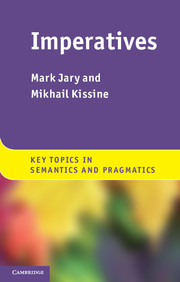Book contents
- Frontmatter
- Contents
- Acknowledgements
- List of abbreviations and notation
- Introduction
- Part I The data
- Part II The theories
- An opinionated conclusion
- Appendix A Possible worlds and semantics
- Appendix B Modality in possible-word semantics
- Appendix C Stalnaker’s common-ground model of assertion
- Glossary
- References
- Index
Appendix C - Stalnaker’s common-ground model of assertion
Published online by Cambridge University Press: 05 July 2014
- Frontmatter
- Contents
- Acknowledgements
- List of abbreviations and notation
- Introduction
- Part I The data
- Part II The theories
- An opinionated conclusion
- Appendix A Possible worlds and semantics
- Appendix B Modality in possible-word semantics
- Appendix C Stalnaker’s common-ground model of assertion
- Glossary
- References
- Index
Summary
In an influential series of publications, the most important of which are collected in his Context and Content (1999), Stalnaker develops an account of assertion in terms of modifications to the common ground. The common ground is the background against which a conversation takes place. It is made up of the propositions that the participants either accept as true or agree to treat as true. (Since propositions can be thought of as sets of possible worlds, the background is thus a set of possible worlds; see Appendix A.) Asserting, according to Stalnaker, is an activity which aims at adding propositions to the common ground. When one asserts, one puts forward the content of one’s assertion for acceptance by the participants in the conversation. If the assertion is accepted, then the content of the assertion becomes part of the common ground.
In this framework, a proposition will be either true or false in any possible world. A proposition p thus picks out a set of possible worlds: all those worlds in which p is true. This is why one can say that propositions are sets of possible worlds (see Appendix A), but, for ease of exposition, we’ll treat a proposition and the worlds it picks out as separate entities. The common ground is made up of consistent propositions. This means that the common ground picks out only those possible worlds in which every one of the propositions accepted as common ground is true. Each of those worlds is a candidate for how the actual world is, as far as the participants are concerned. A felicitous assertion is true in some, but not all, of those possible worlds. Accepting an asserted proposition means that the common ground no longer picks out all those worlds in which the asserted proposition is false. An accepted assertion therefore reduces the number of worlds that are candidates for the actual world, and in doing so reduces uncertainty about how the world is.
- Type
- Chapter
- Information
- Imperatives , pp. 303 - 304Publisher: Cambridge University PressPrint publication year: 2014



